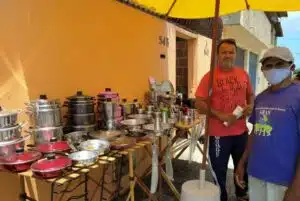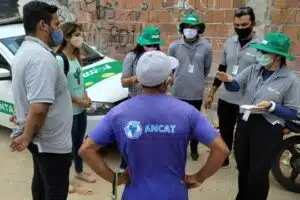By Verena Flues
Even in the age of smartphones, there are territories, especially small towns or peripheral neighbourhoods of big capitals, where personal contact makes all the difference in a campaigns. In such cases, door-to-door visits remain a very important and efficient tool in engaging people.
Although it takes time and affects fewer people, eye-to-eye contact creates bonds and affects people in a powerful and lasting way on the issue. This was one of the strategies chosen to increase the volume of recyclable collection from the accredited collectors in the Re-cycle project, which will exchange human propulsion carts for electric tricycles in the city of Fortaleza.
The project’s area of operation is the neighborhoods where the collectors’ associations are located and where the routes of these professionals pass through. They are districts far from the centre and needy. During four weeks, between the months of October and November, the Re-cycle made a pilot campaign in one of the routes made by the collector Edmilson da Silva Martins, 39 years old.
It is about eight kilometres that he travels three times a week between Granja Portugal and Conjunto Ceará. The neighbourhoods have a population of 60,000 and 43,000 inhabitants respectively. The campaign was established in two phases. In the first phase, agents concentrated on visiting commercial establishments.
Although they are fewer in number than households, the return to the collector in terms of collection volume is much higher than that of households. On the first day of the campaign, the scavenger who follows that route accompanied the agents with his tricycle on part of the route. And this was a decision that brought us many understandings and strengthened others.
The first one is the sympathy and impact that the tricycle has on people. So much that we changed the approach of the campaign in the very first visits. Instead of starting the conversation by asking how the materials were separated there and stressing the importance of this, which ended up having little receptivity and attention to the speech, the agents first showed the tricycle parked at the door.
The commotion for the novelty and the project is instantaneous. The person in charge of the establishment visited stopped everything he was doing and, most of the time, went to the street to see the tricycle up close. We took the opportunity to present Edmilson as the collector of that region to the owners of bars, pharmacy managers, markets and supermarkets. This was one of the most powerful actions that – literally – took the scavenger out of invisibility for some.
The effect was more than all felt by Edmilson himself, who passes through that route three times a week, head down and silent. A presence that is rarely noticed by anyone. It was remarkable the change of physical posture of the scavenger, who started to hold his head high, smiled easily and was more confident in expressing his opinions among the group.
Although subtle, the action created a bond of intimacy between the scavenger and those in charge of the establishment, who were also touched by the theme of recycling and, above all, will have another look at Edmilson and all the professionals who collect recyclables around the city.
The presence of the collector during the campaign, unfortunately, is not possible every day, as it happens during business hours when the professional is working. The idea for the next ones is to get their presence as long as possible.
In the following two weeks, the agents put into practice the second phase of the campaign: the residences. Although in a much larger number than commercial establishments, there are many challenges. Many of the residences are empty because of business hours, the agents did this work during the same period of the electoral campaign for the November elections in Brazil and this caused them to be confused with political party militants, which made many residents not even open the door.
During visits to the residences, the agents were accompanied by a sound car that announced the project and the importance of separating recyclables at home. In this way, we were able to draw the attention of more residents, including those on the streets immediately next to the collector’s route.
At the end of the visits the agents left a folder containing information about the project, how to separate the recyclables and also the days that the collector spends at the site, as well as his mobile number. In the following weeks, the waste picker reported receiving calls from establishments located on his route to pick up material.
A pilot is always a useful opportunity to test ways and strategies and, in the end, trim edges, make hits and go out on the street again. This is exactly what the Re-cycle is starting to do this week in another district of Fortaleza!

